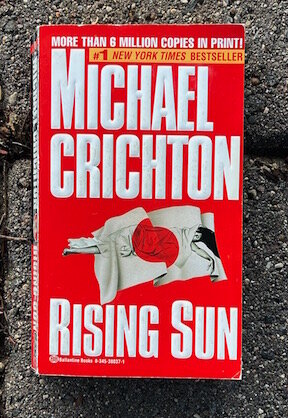Notes on Michael Crichton's Rising Sun
There were only two books that I can recall not being allowed to read as a child: Rising Sun and Disclosure, both by Michael Crichton. When I say child, I mean either fourth or fifth grade. Whatever age that is. Eight, nine, ten? In that range. If you asked me, when I was in fourth grade, who my favorite writer was, I would’ve told you either Brian Jacques or Michael Crichton. Jacques wrote about mice wearing armor carrying swords; Crichton wrote science-based thrillers.
The reason I’m writing about this now is because I finally read Rising Sun this summer. I did not enjoy it. I found the book at a thrift store while looking for books for my little free library. I had been discussing Crichton shortly before seeing it, criticizing him, calling him a hack or something like that. The love I had for Crichton in elementary school turned into disdain somewhere in junior high or high school. The turning points had been reading Timeline and going to a signing he did at a bookstore in Minneapolis.
The signing is the only time I can recall a writer doing strictly a signing, not a reading. I was struck by his coldness, his seeming irritation at being there. I was around twelve, I think. He was sitting. Signing whatever book he was promoting at the time. It might have been Timeline.
The issue I took with Timeline, as a young teenager, was its internal failures of logic. It’s not worth getting into, but the book has a fundamental flaw. It’s based on the premise that they aren’t truly time traveling, but going through a wormhole to the fourteenth century. Okay, fine. To rescue their professor. Sure, whatever. But the way they discover their professor is there, in this other time, is because he writes a note in the margin of some history text. But that wouldn’t work, because he’s not in their timeline. He’s in another. That’s the flaw I was too hung up on to allow me to enjoy Timeline.
The other issue with Timeline is that it seemed to be written to be a movie. Which happened. I never saw it, but I know Paul Walker was in it.
Anyway, I met him at a reading—no, a signing—somewhere in Minneapolis, around that time. Someone asked him to stand up so they could get a photograph with him. He did so begrudgingly. Part of why this sticks with me is because there are so many other writers I’ve met in my life whose public appearances made me like them more, people like Brian Jacques when I was a child, Chuck Palahniuk and T. C. Boyle when I was in high school, Lydia Davis and Susan Orlean in college, Neil Gaiman and George Saunders as an adult. All authors I saw speak whose energy and enthusiasm won me over further. All I remember of Crichton is that long line and his indifference.
Now, back to Rising Sun.
I suppose there would’ve been other books my parents would not have allowed me to read in grade school. Had I brought home Lolita or the Marquis de Sade from the school library, I’m sure they would have had some hesitations, but I can’t remember such an event. Only Rising Sun and Disclosure.
The reason they didn’t want me reading it was the basic premise of a woman being raped and murdered. I think that’s why, at least. I haven’t asked them about it lately. I don’t think either of them read it, but they didn’t think it was third grader material. Fair enough. I’m glad I didn’t read it, having read it now, in 2021, as I’m shocked at how racist and paranoid the book is. It might have aged more poorly than anything I’ve read other than Bonfire of the Vanities.
There isn’t much point in getting into it now. Just that, yeah, I can’t think of any reason anyone should read Rising Sun other than to learn how not to write a neo-noir novel. It lacks suspense and the entire premise is what if Japan is invading the United States, using capitalism? The book is a lot of things. Anti-Japanese, jingoistic, xenophobic, anti-globalist and arguably anti-capitalist. What’s it not is good.
And that’s what drove me to write about it, now. I’ve read forty-two books so far in 2021. Rising Sun is my least favorite of them. And if I’m going to try to write more about books, what better one to write about than the one that brought out some of my strongest opinions?
There are a few questions I like to ask, about any book I’ve read. Here they are, with their answers.
Am I glad I read Rising Sun? Yes. It’s good to see what makes a book bad, and it was nice to re-experience Crichton from a new vantage point in life.
Would I read it again? No way.
Who would I recommend it to? I can’t think of anyone.
And yes, when I was finished with it, I added it to our little free library. I wonder who ended up with it. I hope they did not enjoy it.
